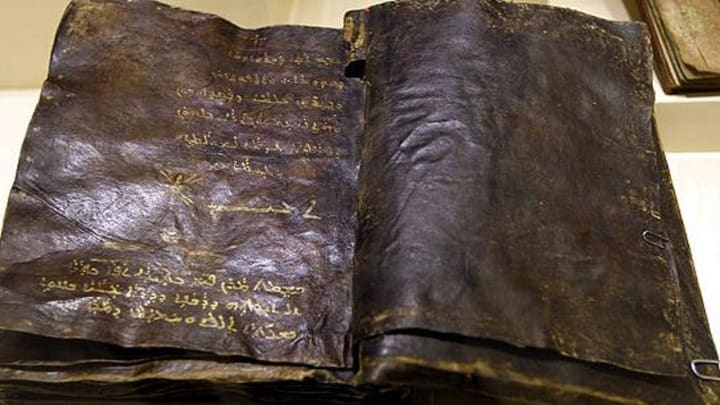
the Vatican altered the Book of scriptures past acknowledgment the genuine Jesus had nearly nothing to do with our customary convictions and the individual executed on the cross wasn't even him that was Judas the Christian church has forever been engaged with embarrassments however as of late it's showed up in moving news progressively frequently we should jump into the subject lastly sort out what's amiss with sacrosanct texts and what Electrifying realities the Vatican is stowing away from us.

The Uplifting news of Barnabas has arisen as a wellspring of discussion, providing reason to feel ambiguous about uncertainty the lessons of the congregation about Christ. Unexpectedly found in 2000 in Cyprus during a normal police activity focusing on thought sellers, the composition's starting points date back hundreds of years. Following broad fights in court traversing north of 10 years, the gospel was at last given over to the Ankara Ethnography Display in Turkey in 2012 for additional assessment.
At the core of this gospel is the statement that it was wrote by Barnabas, a figure not considered as a real part of the 12 pupils, but instead a pioneer among a bigger gathering of 70 observers of Jesus. This goes against the ordinary perspective on Christ's nearest devotees. Moreover, Barnabas communicates serious areas of strength for a towards Paul, a focal figure in the improvement of Christian philosophy, whose epistles are presently viewed as basic to the New Confirmation. The gospel depicts Paul as almost a neurotic because of his faith in Jesus as the Child of God, an idea Barnabas rejects. All things being equal, Barnabas immovably maintains the possibility of monotheism and rejects the idea of the Sacred Trinity, stating that God is solitary, predictable with early Christian idea. The expression "Trinity" itself is missing from the Holy book and was presented by the Primary Board of Nicaea in the fourth century Promotion.
Barnabas keeps on testing ordinary Christian convictions by stating that Jesus was a customary human who experienced divine brightening. The gospel predicts the appearance of a genuine Rescuer 500 years after Jesus' time, a prescience frequently associated with the introduction of Muhammad in Mecca. Also, Barnabas offers an unusual vision of paradise including nine particular levels, likened to layers of sky, where closeness to Natural life impacts one's insight.
A critical curve happens in the gospel's portrayal of the Last Dinner. Barnabas affirms that Jesus anticipated Judas' treachery however sidestepped catch. The account proposes that through help from above, heavenly messengers whisked Jesus away from the window and changed Judas' appearance, prompting his execution all things considered. This viewpoint challenges Paul's understanding of occasions.
Barnabas' solid resistance to Paul and his unmistakable interpretation of pivotal occasions raise doubts of individual predisposition. The gospel's legitimacy has been addressed, especially by specialists who find it improbable that Barnabas was the creator. Inquisitively, the Vatican, notwithstanding its own unsure situation with regards to this issue, supports thought of this gospel by acting mysteriously.
Fights in court encompassing the Uplifting news of Barnabas were extended because of the impedance of chapel specialists who looked to facilitate its handover to a historical center without careful examination. This proposes worry that the new data could sabotage the basic convictions of Christianity, featuring the Vatican's infrequent guile.
The story takes one more verifiable turn with the notice of Flavia Julia Helena Augusta, the mother of Head Constantine the Incomparable. Rumors from far and wide suggest that she found three crosses underneath a construction accepted to be Christ's execution site. The Vatican, with an end goal to smother any disconnected accounts, circulated these alleged relics among different European chapels.
The concealment of elective records and the prohibition of explicit books from the Holy book uncover an example of control practiced by the Vatican over strict texts. The cleansing of specific books in 1684, decreasing the complete from 80 to 66, features the congregation's impact in molding Christian doctrine, a training that happened much of the time in the early hundreds of years of its set of experiences.
One confounding unauthenticated written work is the Good news of Thomas, found close to Bother Hammadi, Egypt, in 1945. It depicts Jesus in an unconventional light, testing ordinary accounts of his life. It presents Jesus as factious and egocentric, accentuating his heavenly nature solely after figuring out how to talk. The gospel's prohibition from the Good book is reasonable because of its petulant substance.
Intriguingly, the gospel recommends that Mary Magdalene could enter heaven provided that she became male, and that uncircumcised men would be rejected from paradise. These perspectives counter the predominant thoughts of orientation correspondence and salvation, mirroring an alternate point of view on Christian convictions.
The smothered history of Pope Joan, a female pope accepted to have managed in the ninth 100 years, further epitomizes the Vatican's propensity to exclude badly designed bits of insight. The Vatican's contemptuous position, notwithstanding authentic proof, highlights the foundation's power in forming strict stories.
The Uplifting news of Barnabas and other substitute records challenge the Vatican's part in forming Christianity. These texts give a brief look into the intricacies of strict history, featuring the battle among custom and receptiveness to new viewpoints. The investigation of these accounts supports decisive pondering the starting points and improvement of strict convictions.






Comments (1)
I have read your article I don't like criticizing but I can only say I disagree. What I like about you is that I can see you are a very articulate writer. My God bless you and give you light